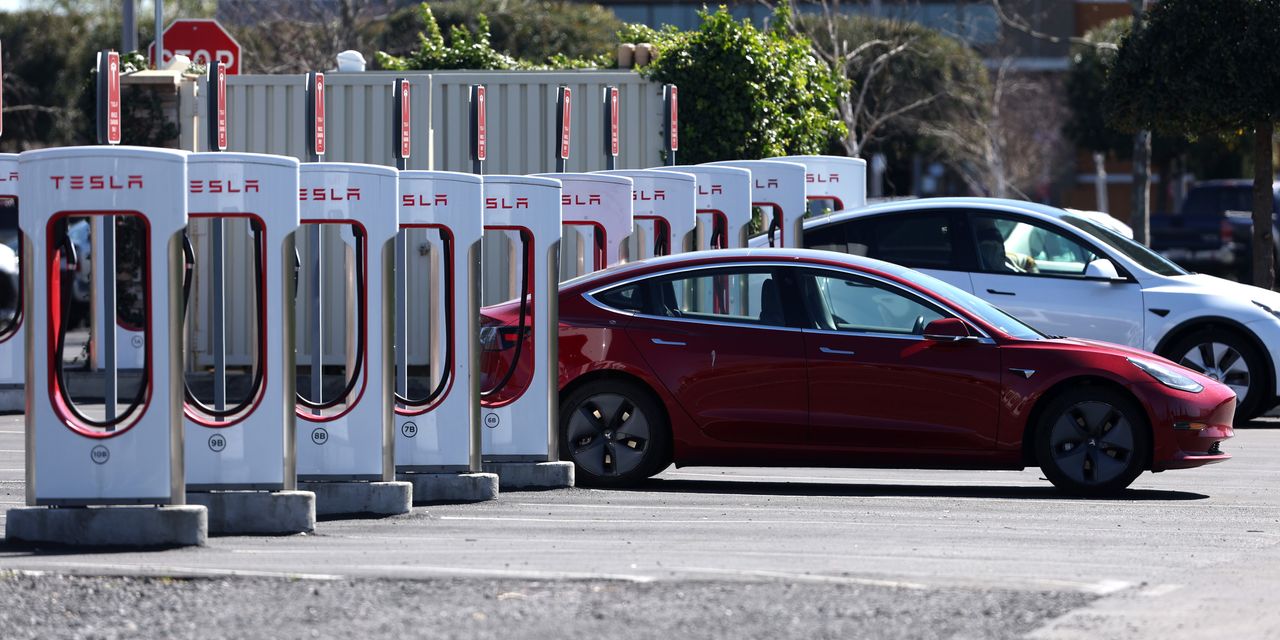The Senate on Sunday approved Democrats’ big healthcare, climate and tax package after a marathon session, notching a victory for President Joe Biden’s party ahead of key midterm elections in November.
By a vote of 51-50 — with Vice President Kamala Harris breaking the tie — senators OK’d the package and sent it on to the Democratic-controlled House of Representatives. Biden on Friday called the bill “a game changer for working families and our economy,” as he also hailed a stronger-than-expected jobs report. No Republicans voted “yes,” as GOP senators argued the measure wouldn’t address soaring inflation but would sock Americans with higher taxes.
The package, agreed to by Senate Majority Leader Chuck Schumer of New York and key moderate Joe Manchin of West Virginia, would pump billions of dollars into climate and healthcare programs over the next decade, paid for by a 15% minimum tax on some large corporations and a 1% tax on stock
SPX,
buybacks. It contains about $430 billion in new spending.
A late deal to attract pivotal Democrat Kyrsten Sinema of Arizona resulted in the dropping of an effort to close the so-called carried-interest loophole. Sinema’s vote was crucial in the 50-50 Senate.
Democrats are facing a tough midterm-election environment amid soaring inflation, and the package will allow them to appeal to voters weary of paying higher prices for gasoline, food and other items. The bill is named the Inflation Reduction Act — though economists are divided on how much it would actually attack inflation.
The bill would beef up renewable energy
ICLN,
production and offer tax rebates for buying new or used electric vehicles. It would extend Obamacare subsidies as well as give Medicare the power to negotiate what it pays for pharmaceuticals
PJP,
In an eleventh-hour change to the bill, Elizabeth MacDonough, the Senate parliamentarian, said lawmakers had to remove language that would have slapped penalties on drugmakers that boost their prices beyond inflation in the private insurance market.
Now see: Senate rules referee weakens Democrat’s drug plan in economic bill but leaves most intact
Also see: Pharmaceutical CEOs use earnings calls to criticize drug-pricing proposal
Still, after the rules arbiter weighed in, the bill was left mostly unchanged, and the White House trumpeted it as the Senate began voting Saturday afternoon.
“This legislation would lower health care, prescription drug, and energy costs, invest in energy security, and make our tax code fairer— all while fighting inflation and reducing the deficit,” said a White House statement.
Treasury Secretary Janet Yellen has told congressional leaders that the measure would either cut or have no effect on the taxes of a family with income less than $400,000 a year.
The bill would also boost funding for the Internal Revenue Service by $80 billion, with the extra money aimed at improving customer service, increasing the number of audits on wealthy people and corporations and upgrading the agency’s technology.
Republicans have savaged the IRS measure — charging that the agency will target middle- and lower-income taxpayers — and the rest of the sprawling bill. The GOP is favored to take the House in November, but its chances for Senate control have dipped recently in prediction markets.
Also see: Betting markets now see Democrats keeping their grip on Senate in midterm elections
“Who in their right mind wants to tax and spend during a recession?” asked Sen. Lindsey Graham, a South Carolina Republican, in a Fox Business Channel interview on Friday.
Sen. Chuck Grassley, an Iowa Republican, attacked the EV credits in the bill in a floor speech on Saturday.
“While Democrat tax hikes hit Americans of all incomes, their proposed benefits are targeted at a privileged few — like helping wealthy Americans purchase an $80,000 electric SUV,” Grassley charged.
The U.S., as MarketWatch has reported, is not officially in a recession. The risks of one, however, are rising, as the Federal Reserve mounts an aggressive campaign of interest-rate increases to cool the economy. The red-hot jobs data reported on Friday is all-but certain to inspire the Fed to raise rates higher.
The final Senate vote came after a marathon session of trying to change the bill known as “vote-a-rama,” in which lawmakers offer multiple amendments. The chamber gaveled in on Saturday and worked through the night and into Sunday morning, with the final vote coming before 3:30 p.m. Eastern.
During the vote-a-rama, Republicans blocked a $35 price cap on insulin costs for patients on private insurance. But Democrats’ goal to lower insulin prices for Medicare is expected to become law, as Politico writes.
Biden and congressional Democrats originally had far bigger plans for their priorities. But while the $2 trillion Build Back Better Act cleared the House last year, it never made it through the Senate. The measure included items like universal prekindergarten and paid family and medical leave. It stalled amid opposition from Manchin and Sinema.
Still, Schumer trumpeted the Inflation Reduction Act on Saturday, saying it met all of the party’s goals: “fighting climate change, lowering healthcare costs, closing tax loopholes abused by the wealth and reducing the deficit.”
Senate Minority Leader Mitch McConnell, a Kentucky Republican, said Democrats’ “so-called inflation bill will not meaningfully reduce inflation at all, and will actually make inflation even worse in the short term.”
The House is planning to return Friday to vote on the bill.
